'Tis the season for a spirited debate! Matt and Jadrian have donned their Santa hats and decided to tackle the age-old question: Was Ebenezer Scrooge from A Christmas Carol good or bad for the economy? Join us as we unwrap the implications of Scrooge's penny-pinching ways. Matt argues that his frugality may have contributed to economic growth, while Jadrian contends that his miserly behavior had broader negative consequences. Get ready for a lively discussion that reveals differing perspectives on the jolly old question: Was Scrooge a boon or a bane for business?
In this episode, we discuss:
How spending can keep an economy moving and saving slows down the economy
Whether Scrooge was secretly a generous person and good for the economy
How this is the last episode of “Season 1”
And a whole lot more!
Catch up on some old episodes:
You can also listen to us on Google Podcasts, TuneIn Radio, and Apple Podcasts. If one of these is your go-to podcast service, be sure to rate us and subscribe!
Watch this episode on YouTube:
Some show notes:
Even though we officially made it through the first season, we both couldn’t celebrate too soon. Matt was wrapping up some last-minute things at work and Jadrian was getting ready to head off for a vacation. Since Matt was in the office, he enjoyed a cold Diet Coke in a Bloomberg coffee mug (Susquehanna has 16 Bloomberg Terminals). Jadrian was officially done for the semester, so he poured himself a White Tide from Rock Wall Brewing.
To prepare our listeners for a festive conversation on Christmas, we wanted to focus on whether Scrooge from A Christmas Carol was good for the economy. If it’s been a while since you even thought about Scrooge, here is some background information from Wikipedia:
Ebenezer Scrooge is the protagonist of Charles Dickens's 1843 short novel, A Christmas Carol. At the beginning of the novella, Scrooge is a cold-hearted miser who despises Christmas. The tale of his redemption by three spirits (the Ghost of Christmas Past, the Ghost of Christmas Present, and the Ghost of Christmas Yet to Come) has become a defining tale of the Christmas holiday in the English-speaking world.
There have been a lot of versions of A Christmas Carol, but there’s a good chance you may turn on the animated version if you have kids in the house this weekend:
There was some debate on whether we should focus on Scrooge from the book or the behavior of someone acting as Scrooge today. We mostly focused on the book version for the sake of our listener’s time. If you’d like a big picture of how A Christmas Carol portrayed some thoughts of famous political philosophers at the time, check out this episode of Planet Money.
Jadrian kicked it off by arguing Scrooge was not good for the economy. He focused on Scrooge’s decision to save money instead of investing or spending, which slowed down the economy. Saving back in the 1800s would not have had the impact it has today because the financial system wasn’t as complex back then. The Industrial Revolution provided a lot of economic growth and prosperity around the world, resulting in what has come to be known as the “hockey stick” of growth:
Matt argued instead that Scrooge was very good for two reasons:
He produced products for society rather than hoarding those for himself. Most of the resources his company produced go to society in the form of products.
By being miserly (not consuming), he allowed other people to consume products that other companies were producing. He could have spent his money buying up products and now enabling others to purchase things.
After a full year of talking about economics, Matt and Jadrian have finally found a topic that they don’t agree on. Listen for the full discussion & join in the discussion by leaving a comment and sharing your thoughts.
Other economists have chimed in on this discussion, which you can check at the Foundation of Economic Education and Steven Landsburg.
This week’s pop culture references:
There are some great ways to incorporate the holidays into your teaching, but it’s worth pointing out that there is a paper by Amanda Mandzik in The Journal of Economics Teaching that highlights some of these scenes in the context of an end-of-year review.
Since we’re sticking with the Christmas theme, Jadrian discussed a scene from Jingle All the Way where shoppers are trying to get a hot new toy despite the prices doubling. He uses this scene every semester when he talks about elasticity and demonstrating “responsive” behavior.
In the spirit of Christmas, Matt discusses gift-giving in Friends and where gift exchanges are not well received. There are a lot of great examples where the show’s characters don’t love the gifts they’ve been given:
Since this is the last episode of 2023, it felt only right to go back to where it all started. We’ve lumped the first episode into Season 1 to make it easier, but that episode included a discussion on gift-giving as well. You can check that out here:
#1: Opportunity Cost & Starting a Podcast
Introducing the brand new podcast by Matt and Jadrian - two busy bees who have taken on yet another project! But why? Tune in to the pilot episode to hear them discuss the reasons behind starting a podcast, the efficiency of gift-giving, and the intersection of pop culture and economics. Don't miss out on this exciting new addition to your listening lin…


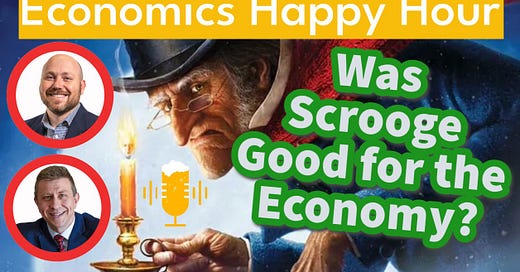
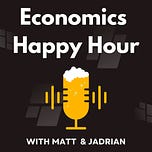




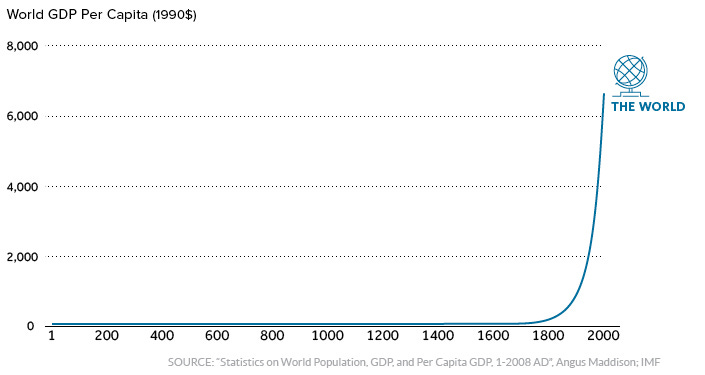





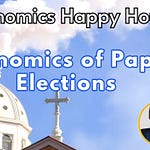
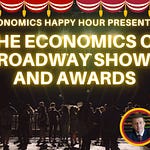

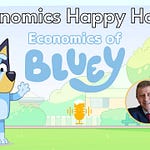

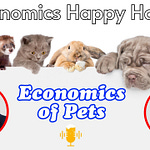

Share this post